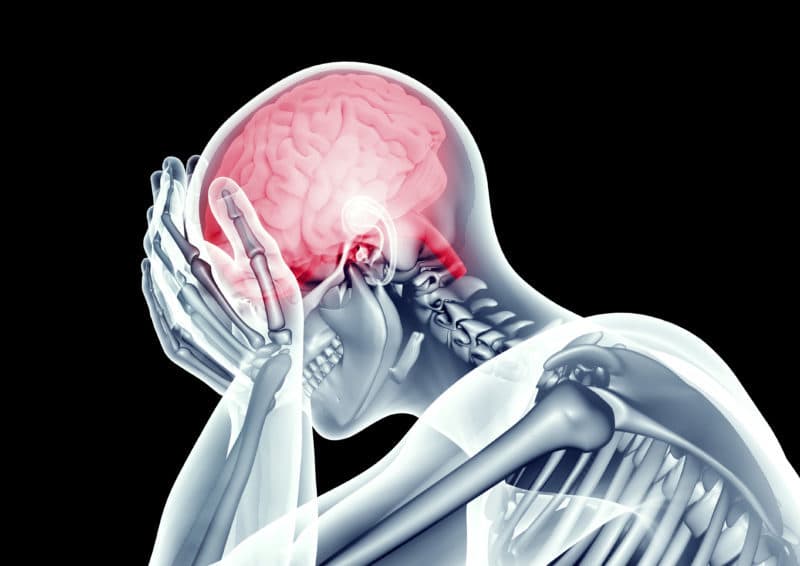Seven Reasons a Brain Injury Can Destroy Your Gut
According to the CDC, incidence of hospital visits for traumatic brain injury have increased over the past decade. It is one of the leading causes of disability world-wide. You may know that the gut and brain are intricately connected but did you know that many people who experience brain trauma often experience resulting gut issues? The gut problems come from alternations in the gut-brain axis or the communication network between our intestines and our cerebral matter. When this delicate network is disrupted, it may result in dramatic gastrointestinal dysfunction, chronic pain or even disability.

According to Dr. Kharrazian, there are seven key ways in which traumatic brain injury can alter GI function, each of which may contribute to your chronic gastrointestinal disorders.
- Autonomic Dysregulation – this occurs when the autonomic nervous system no longer appropriately controls things that should come automatically, like heart rate, breathing, and gut motility. If the system becomes overactive to a sympathetic stimulus the result may trigger a chronic pain loop that is hard to control, leading to abdominal pain.
- Disorders of visceral sensing and processing – Visceral sensing is the gut’s way of telling the brain what is going on. Sensations in the gut such as temperature, pH, contractility communicate with the brain to notify the body what is happening in the digestive system. Disruption of these sensing circuits is one of the main factors implicated in irritable bowel disorders (IBS). Brain injury often contributes to a broken communication network between gut and brain.
- Increase in intestinal permeability (leaky gut) – After brain injury the tight junctions that connect the cells that line your gut often become dysfunctional and allow large molecules to enter from the digestive tract into the blood stream. Normally these tight junctions are protecting you from the large molecules, such as undigested food particles, bacterial parts or other luminal contacts that could cross over into the blood stream. We know that the increase in intestinal permeability is a key factor in the development of autoimmune diseases, from Hashimoto’s thyroiditis to multiple sclerosis.
- Compromise of intestinal mucosa – Very commonly after brain injury, there is a compromise in the health of the mucosal lining. We see this in patients in the Intensive Care Unit (ICU) as well… anytime the body is under massive stress, there is a tendency for the mucosa that lines the gut to atrophy and die. The changes we see are often immediate and occur within minutes after brain injury, severe trauma or infection.
- Breakdown of the blood-brain barrier (BBB) – The BBB, as it is affectionately known, protects your delicate gray matter from outside chemicals and inflammatory agents that may cause problems if allowed to enter. After a brain injury, this barrier is often compromised, allowing massive inflammatory triggers inside the brain where they do not belong.
- Brain Immune Dysfunction – The Central Nervous System (CNS) controls much of the immune system and the production of inflammatory signaling molecules, like cytokines. If there is an injury to the signaling mechanism it may contribute to either over-activation or under-activation of the immune system This can lead to either immune compromise or autoimmune disease, where the body attacks itself.
- Impaired gut motility – Sadly we see this as a factor in many disorders such as intestinal dysbiosis and SIBO (small intestinal bacterial overgrowth). The impairment in smooth muscle contractility of the gut mucosa leads to dysmotility. This dysmotility leads stagnation and alteration in bowel function and even malabsorption. Ultimately patients may have very severe symptoms related to this problem of abnormal peristalsis in the gut.
Can see how these many mechanisms of action on the gut after brain injury may contribute to chronic pain and dysfunction, not only in the gut but the immune system as well? Here’s some simple things you can do to ensure you will maintain a healthy gut for life!
So What Can I Do to Maintain a Healthy Gut?
- Eat a variety of colorful organic and local produce
- Avoid genetically modified foods and glyphosate which contribute to a leaky gut
- Take a daily multi-strain probiotic to support your microbiome and immune system
- Eat prebiotic-rich fruits and vegetables to feed your healthy gut bugs
- Protect your noggin! Wear a helmet if you are skiing, biking or doing any activity that involves risk of head trauma
- Try Restore, my favorite new product to restore gut health and heal tight junctions. Call Amy at #303-993-7910 if you would like more info….


